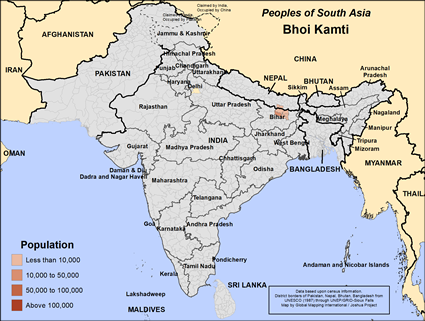Bhoi Kamti in Nepal

Send Joshua Project a photo
of this people group. |

Map Source:
People Group data: Omid. Map geography: UNESCO / GMI. Map Design: Joshua Project
|
| People Name: | Bhoi Kamti |
| Country: | Nepal |
| 10/40 Window: | Yes |
| Population: | 1,200 |
| World Population: | 31,200 |
| Primary Language: | Maithili |
| Primary Religion: | Hinduism |
| Christian Adherents: | 0.00 % |
| Evangelicals: | 0.00 % |
| Scripture: | New Testament |
| Ministry Resources: | Yes |
| Jesus Film: | Yes |
| Audio Recordings: | Yes |
| People Cluster: | South Asia Hindu - Bhoi |
| Affinity Bloc: | South Asian Peoples |
| Progress Level: |
|
Introduction / History
Traditionally the Kamti Bhoi were agricultural laborers. They are considered a nomadic tribe that migrated from India.
Where Are they Located?
Kamti Bhoi people are all over India, especially in the states of Maharashtra, Madhya Pradesh, Odisha, Uttar Pradesh, and West Bengal. A smaller number live in southern Nepal.
What Are Their Lives Like?
The Kamti Bhoi community in Nepal is mainly a landowning one, but a few are landless. A Brahmin priest officiates at their marriages. At the wedding, the bride and groom walk around a fire seven times.
What Are Their Beliefs?
Every Kamti Bhoi house has an altar to Manasamata, a Hindu god. Beside this, there are images of Khandoba and a few other gods and goddesses. Every family has a number of deities.
What Are Their Needs?
Vocational believers may have opportunities to live among the Kamti Bhoi people, creating opportunities to be in daily contact with them to earn respect, and confidence, and hopefully the privilege to speak God's truth in their midst.
Though Kamti Bhoi have a high standing within their culture, they are poor, needy, and without hope in this world without their Savior and sin-bearer.
Prayer Points
There may be no followers of Jesus among the Hindu Kampti Bhoi community at present; pray for fellowships and disciple making movements to soon emerge among them.
Pray that the Kampti Bhoi community will care for their families above their deities.
Pray they will make schooling a priority for their children, so the children will be equipped to live in modern times.